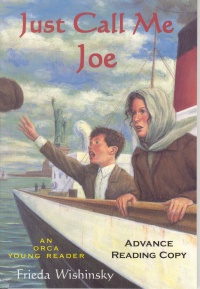| ________________
CM . . .
. Volume X Number 6. . . . November 14, 2003
excerpt:
It is the year 1909, and young Joseph and his older sister Anna are bound for new lives in America. They are leaving behind them the days of anxiety and fear in their Russian shtetl where murderous soldiers would often sneak up on unfortunate Jews in the woods or come bursting into their homes in the middle of the night. Joseph's parents, wanting better for their children, had managed to scrape up enough money to send the two of them to New York to live with their Aunt Sophie in a land that would provide the safety and opportunities that their own homeland could not. Joseph is excited at the mere prospect of all the adventures that await him. But, contrary to popular belief, the streets of America are not paved with gold and there are challenges to be faced there too. Aunt Sophie lives in terrible poverty, and even though she is thrilled to have her niece and nephew with her, she must struggle to provide for them. She takes in boarders, including stinky Mr. Plucknik with whom Joseph must share his room, and Anna works long, hard hours at a dreadful factory to help make some much-needed money. Meanwhile, Joseph tries valiantly to make new friends and adjust to his new school. Unfortunately, he must be placed with the little grade ones until he learns English which makes it difficult for him to find acceptance amongst the boys his own age. The only boys who seem willing to befriend him are Sam and his cohorts, but Sam's friendship seems to constantly put him in conflict with his own conscience. Joseph (or Joe as he now prefers to be called) is ultimately called upon to make some important decisions about his new friends and about the person he, himself, wishes to be. This book is an interesting snapshot of a not-so-distant time in history. Young readers will be intrigued by the glimpse into this time and place that Wishinsky provides while also identifying with many of Joe's feelings and dilemmas. Readers will certainly be struck by the enormity of the journey that Joe and his sister undertake and how overwhelming it must have felt for a young lad of ten years. Readers will also no doubt feel for him as he agonizes over the thought that the American officials might yet turn him away and send him back home to Russia. I think that Wishinsky ably demonstrates how the reality of life in America was radically different from the idyllic notions with which many immigrants arrived, and how many of them found themselves working pitifully hard at thankless and unrewarding jobs just to eke out a meager existence. Anna's situation in the story illustrates that plight as she laments the terrible and unfair working conditions, and she even begins to question whether they should stay; perhaps the hardships they faced back home were no worse than the demoralizing state of her new existence. And she also notes how Joseph has changed since their arrival! As the central character in this story, Joe faces numerous challenges with which children of today also still grapple. All young readers will readily sympathize with his feelings of loneliness as he stands alone in the school yard; they will recognize the courage it took for him to approach the boys his own age and ask to join in their games; and they will identify with his feelings of hurt and humiliation at their cruel rejection. These are very real and major elements of young lives in every generation, and so Joseph's plight will speak to many. They will also appreciate how hard it was for him to stand up to Sam and to choose a better way. I really liked the way in which Joe recognizes, when Aunt Sophie tells him about the young thieves who stole all the money from her purse, that, if he had followed Sam, he, too, could have become just that sort of thief. I also liked the way in which his teacher's kindness and trust in him, as she loaned him her book of poetry to study, helped inspire him to make the right decision about his friendship with Sam. I did, however, think that many of the characters in the book were a little too one-dimensional, and I believe that the story may have had a bigger impact if it had been peopled with more well-rounded and multi-faceted individuals. For example, I had expected to learn a little more about Mr. Plucknik and to perhaps discover that there was more to him than his crusty exterior and his raucous snoring. It may have also been interesting to get a fuller picture of Sam and his friends too. However, given the younger age group for which it is intended, this book still provides much food for thought and a story that will transport them to a time and place that they may know little about. It is a worthy addition to school library shelves, particularly given the need for books that are of a fairly beginner reading level but which still provide a stimulating storyline. Recommended. Lisa Doucet is a children's bookseller at Woozles in Halifax, NS.
To comment
on this title or this review, send mail to cm@umanitoba.ca.
Copyright © the Manitoba Library Association. Reproduction for personal
use is permitted only if this copyright notice is maintained. Any
other reproduction is prohibited without permission.
NEXT REVIEW |TABLE OF CONTENTS FOR THIS ISSUE
- November 14, 2003.
AUTHORS
| TITLES | MEDIA REVIEWS
| PROFILES
| BACK ISSUES
| SEARCH | CMARCHIVE
| HOME |
